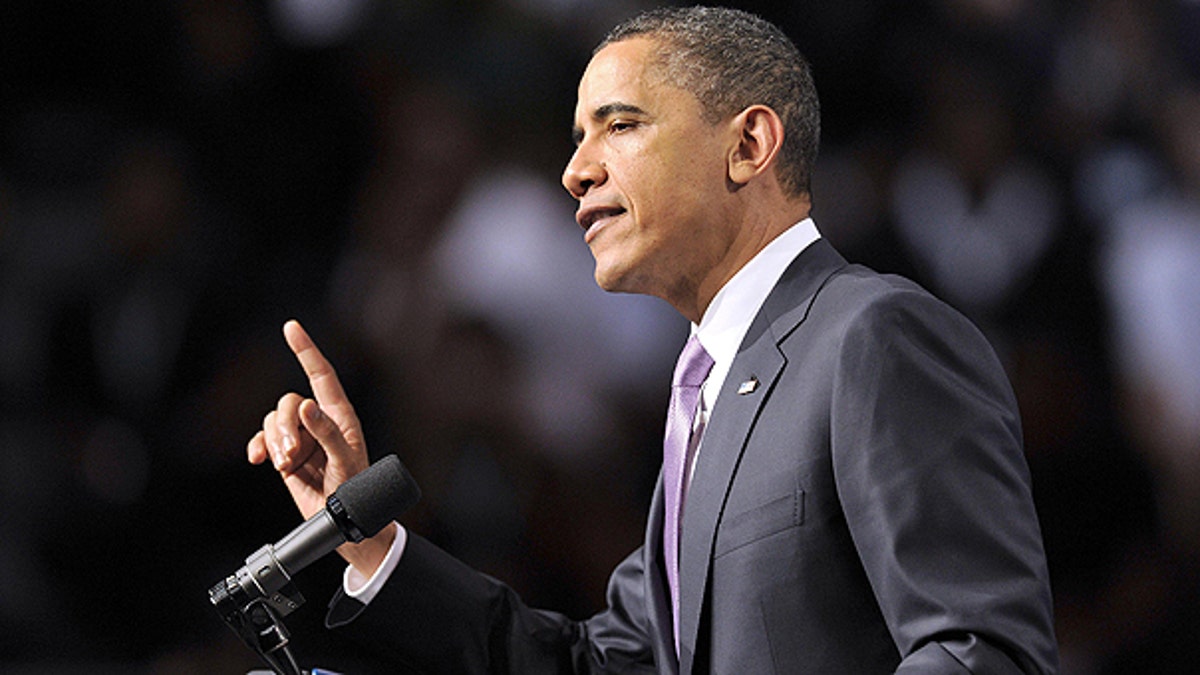
March 4: President Obama gestures while speaking at Miami Central Senior High School in Miami. (AP)
Leading advocates for the world’s poorest and hungriest are urging President Obama not to “overreact” to recent spikes in food prices, particularly by imposing export bans on U.S. agricultural products.
In its February report, the World Bank noted “sharp increases” in the global prices of wheat, maize, sugar, and edible oils over the last six months, with an accompanying rise, albeit smaller, in the price of rice. The bank’s food price index surged by 15 percent over the last quarter of 2010, and stands only three percentage points below its peak, reached in June 2008. Since then, an estimated 44 million people in developing countries have fallen below the poverty line.
Rising food prices have been linked to the unrest that has swept through the Middle East and North Africa in recent weeks. In most of the uprisings, calls for greater personal and political freedoms have been accompanied by complaints about unaffordable staple food prices.
Asked by FOX News how they would advise the Obama administration to contend with the spikes – which have as much to do with natural disasters and weather shocks as with human factors – both Hassan Zaman, lead economist at the World Bank’s Poverty Reduction and Equity Group, and Manuel Hernandez, a postdoctoral fellow at the International Food Policy Research Institute (IFPRI), said they would caution the president not to manipulate food markets with trade policy.
“I would tell him, ‘Try to not overreact to the increasing prices we are seeing right now,’” said Hernandez, a Peruvian-born economist educated at the University of Texas. “We should expect fluctuations, but we shouldn't exacerbate these fluctuations by…imposing obstructions to the market that could make things worse…The situation is not the same as in 2007 and 2008. So there is no major concern that we should worry about another food crisis.”
“What’s important,” agreed Zaman, “is that the international community in general – through, say, mechanisms like the G-20 – collectively engage in steps such as ensuring that there are as few exports restrictions as possible on food grains. That is fundamental, because we've seen that export restrictions are highly related to spikes in food prices.”
Those hardest hit by the current inflation in food costs are poor people in urban areas, where there is no subsistence farming and residents must always pay for food at market prices. After that, Zaman said, women and children tend to suffer disproportionately, especially in foreign cultures that do not accord them preferential treatment when it comes to distribution of food within the home.
The middle of the last decade witnessed the worst crisis in food prices in recent times. An IFPRI report found that between January 2004 and May 2008, the price of rice spiked by 224 percent; wheat prices soared by 108 percent; and the cost of corn shot up by 89 percent. Thirty-six countries appealed for food aid, with several experiencing civil unrest.
“It is important for vulnerable countries to know that if there is a crisis, the global community will respond,” said Assistant Secretary of State P.J. Crowley, in a recent statement in which the Obama administration articulated the “lessons learned” from the 2007-2008 crisis. Among them the State Department cited restrictions on imports, “targeted safety nets” for the poor and hungry, and record investment in the agricultural sectors of China, Russia, and India.
“We still have plenty of stocks, and the productions are not as bad as in 2007 and 2008,” said IFPRI’s Hernandez, in arguing that the world, despite last year’s spikes, is not hurtling toward a repeat of dismal recent history. “Just to give an example, in the case of wheat, we have stocks of over 177 million metric tons, which is over 50 million metric tons more than [we had] in 2007 and 2008. Additionally, rice is doing good, which is another important agricultural commodity; oil prices are not as high as in 2008; and also, the governments are not overreacting, as they overreacted before.”




